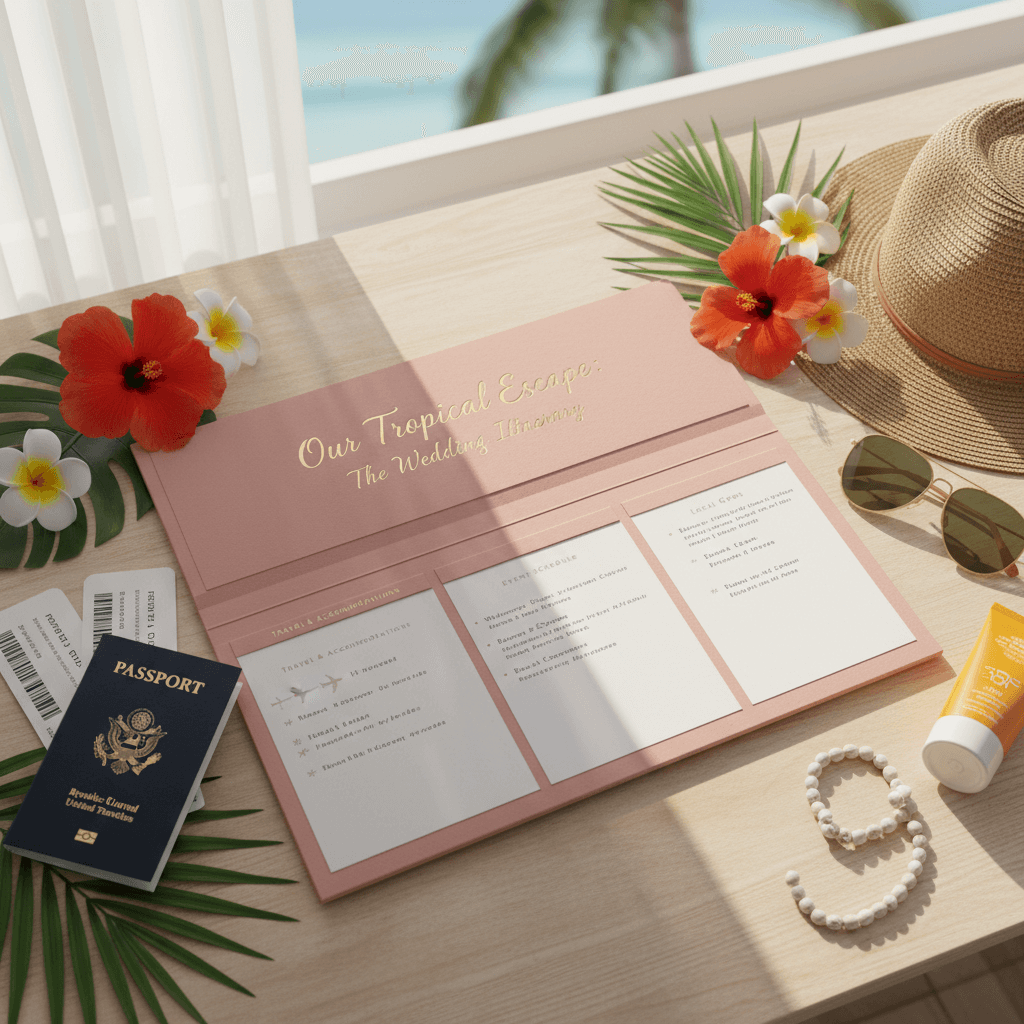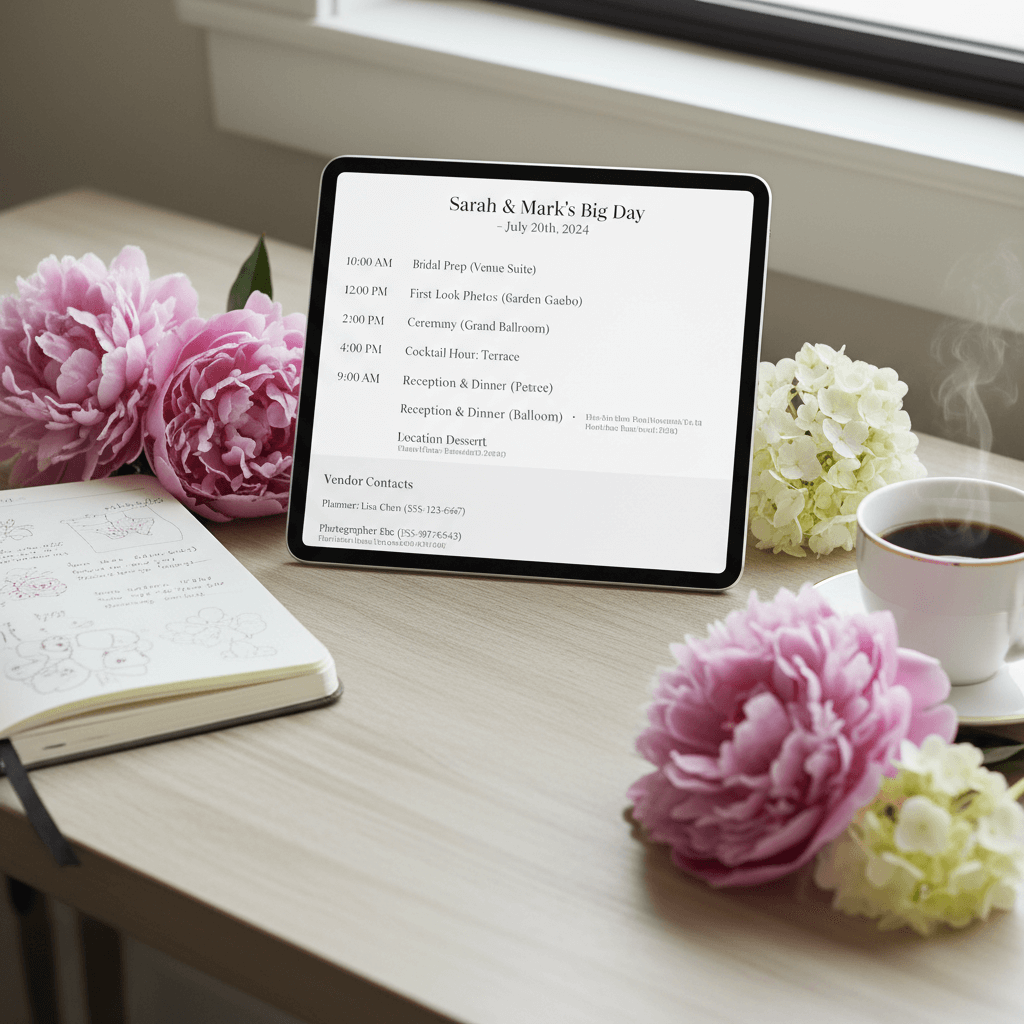Wedding Itinerary Planning
Create Perfect Wedding Day Flow
Wedding itinerary planning orchestrates the complex choreography of your celebration, ensuring that every element flows seamlessly from ceremony to reception while maximizing guest enjoyment and minimizing stress for everyone involved. A well-crafted itinerary serves as the blueprint for your entire wedding day, coordinating vendor services, guest experiences, and celebration milestones into a cohesive and memorable event.
Modern wedding itineraries must balance multiple competing priorities: vendor logistics requirements, guest comfort and engagement, photography and videography needs, catering service windows, and the couple's personal celebration preferences. This complexity requires sophisticated planning that considers not just what happens when, but how each element affects the others and contributes to the overall celebration atmosphere.
The most successful wedding itineraries create natural rhythm and pacing that guides guests through different celebration phases while providing appropriate time for each element to unfold properly. Whether planning an intimate gathering or a grand celebration, effective itinerary planning ensures that your wedding day feels organized and relaxed rather than rushed or chaotic.
Pre-Ceremony Timeline and Preparation
Pre-ceremony timeline planning sets the foundation for your entire wedding day, establishing the pace and stress level for all subsequent events. Preparation scheduling must account for hair and makeup timing, photography sessions, vendor setup requirements, and transportation coordination while building in buffer time for unexpected delays or last-minute adjustments.
Bridal party coordination represents one of the most complex aspects of pre-ceremony planning, involving multiple people with different preparation needs and timeline requirements. Hair and makeup scheduling must consider complexity levels, travel time between locations, and photographer arrival timing for getting-ready photos. Effective coordination ensures that everyone is ready on time without feeling rushed or stressed.
Vendor coordination during preparation hours requires careful attention to setup schedules, delivery timing, and workspace requirements. Florists need access for ceremony and reception decorating, caterers require setup time and kitchen access, and musicians need time for equipment setup and sound checks. Coordinating these competing space and timing needs prevents conflicts that could delay ceremony start times.
Professional Itinerary Tools
Master wedding day coordination with advanced itinerary planning tools at planning.wedding/itinerary – designed for seamless day-of coordination and timeline management.
Wedding Itinerary Examples
Explore these professional wedding itinerary designs to inspire your own day-of coordination. Each example demonstrates different approaches to schedule organization, timing coordination, and guest communication.

Destination Wedding Schedule

Digital Itinerary System

Elegant Printed Design

Wedding Party Schedule

Guest Timeline Card

Weekend Event Schedule
Ceremony Timing and Flow Management
Ceremony timeline planning involves more than simply scheduling start and end times – it requires understanding the natural flow of ceremonial elements while accommodating guest comfort, weather considerations, and photographer positioning needs. Processional timing should allow for dignified pacing while maintaining guest attention and creating appropriate emotional impact.
Religious and cultural ceremony requirements often dictate specific timing elements that affect overall itinerary planning. Understanding these requirements early in the planning process ensures that adequate time is allocated while respecting traditional practices and family expectations. Some ceremonies involve multiple elements or locations that require careful coordination and guest guidance.
Photography and videography coordination during ceremony timing requires balancing documentation needs with ceremony sanctity and guest experience. Professional photographers need positioned access and adequate lighting conditions, while videographers require audio setup time and equipment positioning. Coordinating these technical requirements with ceremonial elements ensures comprehensive documentation without ceremony disruption.
Cocktail Hour and Social Flow
Cocktail hour planning serves multiple purposes beyond guest entertainment – it provides transition time between ceremony and reception while allowing vendor reset activities and final photography sessions. Effective cocktail hour timing gives vendors adequate time for space transformation while keeping guests engaged and comfortable during what could otherwise be an awkward waiting period.
Entertainment and refreshment coordination during cocktail hours requires understanding guest demographics, venue layout, and weather contingencies. Music selection should create appropriate atmosphere while allowing conversation, and refreshment service should accommodate various dietary needs and drinking preferences. Interactive elements like signature cocktails or appetizer stations help create engagement and social mixing opportunities.
Photography scheduling during cocktail hours often includes family photos, wedding party photos, and couple portraits that couldn't be completed before the ceremony. This photography work must be coordinated with guest entertainment and vendor setup activities to ensure that all priorities are addressed without compromising any element of the celebration experience.
Reception Pacing and Entertainment Flow
Reception timeline planning creates the celebration's emotional arc, building energy through different phases while accommodating meal service, traditional elements, and entertainment programming. The most successful receptions balance structured programming with organic social interaction, allowing natural celebration to unfold while ensuring that important elements receive appropriate attention and timing.
Meal service coordination affects every aspect of reception timeline planning, from cocktail hour duration to dancing schedule timing. Understanding your caterer's service capabilities, guest count implications, and dietary accommodation requirements helps create realistic timeline expectations while ensuring that food quality and service standards meet your expectations.
Traditional element timing, including toasts, cake cutting, bouquet toss, and first dance scheduling, requires coordination with meal service, photography needs, and guest engagement levels. These elements should feel natural and well-timed rather than interrupting conversation or forcing guest attention when energy levels don't support formal programming.
Vendor Coordination and Logistics
Vendor timeline coordination ensures that all service providers can execute their responsibilities effectively while supporting overall celebration flow and guest experience. Each vendor has specific timing requirements, setup needs, and coordination dependencies that must be integrated into the overall itinerary without creating conflicts or service compromises.
Setup and breakdown scheduling requires understanding each vendor's space and time requirements while coordinating access to shared spaces and resources. Florists might need early access for decorating, while band setup requires different timing and space allocation. Effective coordination prevents vendor conflicts while ensuring that all services can be delivered at optimal quality levels.
Communication protocols during wedding day execution ensure that timeline adjustments, unexpected situations, and coordination needs can be handled efficiently without disrupting guest experience or creating vendor confusion. Designated coordinators should understand vendor timing requirements and have authority to make minor adjustments when necessary.
Guest Experience and Comfort Considerations
Guest experience planning ensures that itinerary timing supports comfort, engagement, and enjoyment throughout the entire celebration. Understanding guest demographics, travel considerations, and energy patterns helps create timeline flows that work well for your specific guest group rather than following generic scheduling templates that might not fit your celebration's unique characteristics.
Age group considerations affect timeline planning significantly, especially when celebrations include elderly relatives, young children, or guests with mobility limitations. Ceremony timing, reception duration, and activity scheduling should accommodate these needs while maintaining overall celebration energy and enjoyment for all guests.
Transportation and departure coordination helps guests plan their evening while ensuring that celebration energy is maintained throughout the planned timeline. Clear communication about expected timing helps guests make appropriate transportation arrangements while understanding when different celebration phases will occur.
Comprehensive Itinerary Resources
Access expert wedding itinerary planning tools and coordination resources at planning.wedding – everything you need for flawless wedding day coordination.
Contingency Planning and Flexibility
Weather contingency planning affects itinerary timing significantly, especially for outdoor ceremonies or celebrations with outdoor elements. Backup timing scenarios should account for setup changes, guest comfort considerations, and vendor adjustment requirements while maintaining celebration quality and guest experience standards.
Timing buffer integration throughout the itinerary provides flexibility for minor delays, unexpected situations, or spontaneous celebration moments without compromising overall timeline adherence. Strategic buffer placement prevents small delays from cascading into major timing disruptions that could affect vendor services or guest experience.
Emergency communication protocols ensure that significant timing changes, venue issues, or other unexpected situations can be managed professionally without creating guest confusion or panic. Designated coordination personnel should understand communication responsibilities and have access to guest contact information for emergency notifications.
Technology Integration and Communication
Digital itinerary sharing ensures that all relevant parties have access to current timeline information while providing easy reference during wedding day coordination. Mobile-friendly itinerary formats allow vendors, family members, and coordination personnel to reference timing information easily without requiring paper copies that might become outdated or lost.
Real-time updates and timeline adjustments can be communicated efficiently through integrated coordination systems that notify all relevant parties simultaneously. This technology integration prevents communication gaps that could lead to timing confusion or service disruptions during critical celebration moments.
Guest communication integration helps couples share appropriate timeline information with guests while maintaining coordination privacy for vendor and logistical details. Guests benefit from knowing ceremony start times, cocktail hour duration, and reception timing without needing access to detailed vendor coordination information that could be overwhelming or confusing.